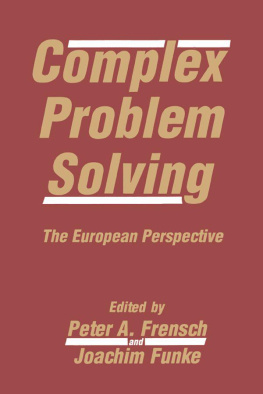COMPLEX
PROBLEM SOLVING
The European Perspective
COMPLEX
PROBLEM SOLVING
The European Perspective
Edited by
PETER A. FRENSCH
University of Missouri at Columbia
JOACHIM FUNKE
University of Bonn, Germany
First Published 1995 by Lawrence Erlbaum Associates, Inc.
Published 2014 by Psychology Press
711 Third Avenue, New York, NY 10017
and by Psychology Press
27 Church Road, Hove, East Sussex, BN3 2FA
Psychology Press is an imprint of the Taylor & Francis Group, an
informa business
Copyright 1995, by Lawrence Erlbaum Associates, Inc.
All rights reserved. No part of this book may be reprinted or reproduced or utilised in any form or by any electronic, mechanical, or other means, now known or hereafter invented, including photocopying and recording, or in any information storage or retrieval system, without permission in writing from the publishers.
Trademark notice: Product or corporate names may be trademarks or registered trademarks, and are used only for identification and explanation without intent to infringe.
Library of Congress Cataloging-in-Publication Data
Complex problem solving: the European perspective / edited by Peter
A. Frensch, Joachim Funke.
p. cm.
Includes bibliographical references and index.
ISBN 0-8058-1336-5 (cloth: alk. paper). ISBN 0-8058-1783-2
(paper: alk. paper)
ISBN 978-0-805-81783-6 (hbk)
1. Cognitive neuroscience. 2. Cognitive science. I. Frensch,
Peter A. II. Funke, Joachim.
QP360.5.C66 1995
153.43dc20 95-4455
CIP
Publishers Note
The publisher has gone to great lengths to ensure the quality of this reprint but points out that some imperfections in the original may be apparent.
We dedicate this book to Donald E. Broadbent who suddenly and unexpectedly passed away during the final stages of the project. He was both an initiator and a very active contributor to the complex problem-solving scenes in Europe and North America, and was, perhaps more than anybody else, familiar with, and comfortably working within, the two approaches. Donald Broadbent will be deeply missed.
Contents
Peter A. Frensch and Joachim Funke
Axel Buchner
Dietrich Drner and Alex J. Wearing
Berndt Brehmer
Dianne C. Berry and Donald E. Broadbent
Oswald Huber
Jens F. Beckmann and Jrgen Guthke
Josef F. Krems
Uwe Funke
Joachim Funke
Rainer H. Kluwe
Robert J. Sternberg
Jens F. Beckmann, Psychologisches Institut, Universitt Leipzig, Tieckstr. 2, D-04275 Leipzig, Germany
Dianne C. Berry, Department of Psychology, University of Reading, Earley Gate, Whiteknights, Reading RG6 2AL, England
Berndt Brehmer, Department of Psychology, University of Uppsala, Box 1854, S-751 48 Uppsala, Sweden
Donald E. Broadbent (deceased), Department of Experimental Psychology, University of Oxford, South Parks Road, Oxford, OX1 3UD, England
Axel Buchner, FB1Psychologie, Universitt Trier, Universittsring 15, D-54286 Trier, Germany
Dietrich Drner, Lehrstuhl Psychologie II, Universitt Bamberg, Markusplatz 3, D-96047 Bamberg, Germany
Peter A. Frensch, Department of Psychology, University of Missouri-Columbia, 210 McAlester Hall, Columbia, MO 65211
Joachim Funke, Psychologisches Institut, Universitt Bonn, Rmerstr. 164, D-53117 Bonn, Germany
Uwe Funke, Lehrstuhl fr Psychologie, Universitt Hohenheim, Institut 540 F, D-70593 Stuttgart, Germany
Jrgen Guthke, Psychologisches Institut, Universitt Leipzig, Tieckstr. 2, D-04275, Leipzig, Germany
Oswald Huber, Psychologisches Institut, Universitt Fribourg, Route des Fougres, CH-1701 Fribourg, Switzerland
Rainer H. Kluwe, Institut fr Kognitionsforschung, Universitt der Bundeswehr, Holstenhofweg 85, D-22043 Hamburg, Germany
Josef F. Krems, Institut fr Psychologie, Universitt Regensburg, Universittsstr. 31, Gebude PT, D-93053 Regensburg, Germany
Robert J. Sternberg, Department of Psychology, Yale University, Box 208205, New Haven, CT 06520-8205
Alex J. Wearing, Department of Psychology, University of Melbourne, Parkville, Victoria 3052, Australia
Imagine your typical 5-year-old sliding all over the living-room floor while feverishly using her Lego building blocks to construct the worlds biggest mansion. And imagine the engineer at the Chernobyl Nuclear Power Station thinking of all possible ways to stop the greatest atomic disaster from happening. Both the 5-year-old and the seasoned engineer engage in complex problem solving (CPS). At an abstract level, we might define complex problem solving as thinking that
occurs to overcome barriers between a given state and a desired goal state by means of behavioral and/or cognitive, multistep activities. [In CPS,] the given state, goal state, and barriers are complex, change dynamically during problem solving, and are intransparent, [and] the exact properties of the given state, goal state, and barriers are unknown to the solver. CPS implies the efficient interaction between a solver and the situational requirements of the task, and involves a solvers cognitive, emotional, personal, and social abilities and knowledge. (Frensch & Funke, this volume)
Clearly, complex problem solving, defined in this way, is ubiquitous, even though the results of such problem solving are, gratefully, not always as important as they were in the Chernobyl example mentioned earlier. However, not every task we face gives rise to complex problem solving. Rather, at least according to our definition, a problem must be (a) novel, (b) complex, (c) dynamically changing over time, and (d) intransparent before we can legitimately call our dealings with the problem complex problem solving. CPS, thus, is not a straightforward extension of simple problem solving (SPS), that is, problem solving involving relatively simple problems such as choosing the right clothes for a festive occasion. Instead, CPS and SPS are qualitatively different. For example, SPS frequently serves to overcome a single barrier; CPS, in contrast, deals with a large number of barriers that coexist simultaneously. Because there are multiple barriers, a single cognitive or behavioral activity may not be sufficient to reach the goal state. Rather, a well-planned, prioritized, set of cognitions and actions may need to be performed in order to get closer to the desired goal state.
Complex problem solving, then, is a topic that deserves our all attention, and certainly the attention of experimental psychologistsif only for the potentially disastrous consequences of problem solving gone awry. Why, however, do we need an entire volume dedicated to European research on CPS? The answer is twofold: First, we need such a book because much of the existing, original European research has been published exclusively in non-English-language journals or books and has not been accessible to North American scholarswith the exception of those of us lucky enough to be familiar with several languages. And second, we need such a book because European research on CPS has a flavor that is quite different from that of most of the research conducted in North America. That is to say that both the theoretical and empirical approaches to studying CPS have been quite different in Europe and North America during roughly the past two decades.










